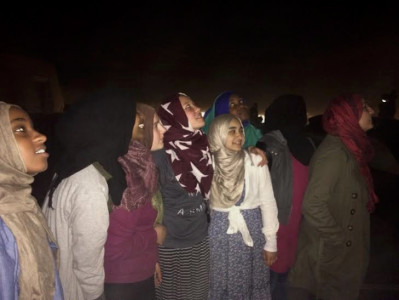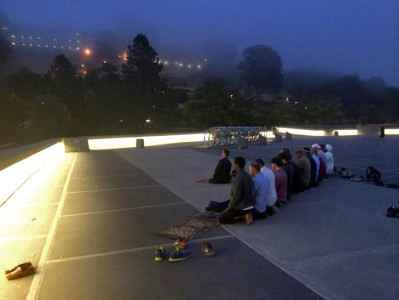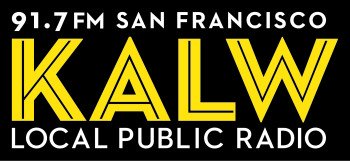July 29, 2014-This past Sunday, members of the Bay Area Muslim community gathered on local hilltops, from Mt Tamalpais in Marin, to Cal State East Bay, to the hills of UC Berkeley. What were they doing? Looking up to the sky for the new crescent moon that signifies the end of the fasting month of Ramadan, when Muslims abstain from food and drink from sunup to sundown.
Islamic tradition says to end the fast once the new moon is seen. But some Muslims have recently been using a different method to calculate the end of Ramadan., Not everyone agrees. And this conflict plays out not only in places like Indonesia, Pakistan, or Morocco, but right here in the Bay Area. About a month ago, at the beginning of Ramadan, KALW’s Hana Baba joined a group in Berkeley who were hoping to sight the moon themselves .
About 20 Muslim families are gathered on a hilltop outside the Lawrence Hall of Science in Berkeley. It’s just after sunset. A water fountain bubbles, women and men chat, kids run around with snacks in their hands. And everyone at some point or another, looks up to the sky.
They’re moonsighting, scanning the sky for the new crescent moon that will signify the beginning of the month, Ramadan. Every year, they come here to fulfil a centuries-old tradition of the Prophet Muhammad, who said “Fast when you see it, and break your fast when you see it”- meaning, the new moon. If they see it, they’ll start their fast the next day. If they don’t, they won’t. They start the next day.
Zarreen Zowjah-Malik is standing close by in a wool overcoat. She says her family loves to moonsight. I ask her if she’s ever spotted the new crescent moon.
“I have!, she says, “I’ve sighted the moon in this very spot, 4 or 5 years ago ! And we actually saw the crescent, we were all very excited to see it!”
Not everyone, though, is uncertain about when Ramadan starts. About an hour south of the Berkeley Hills, lies the Muslim Community Association, or MCA, - a mosque in Santa Clara. In the midst of Silicon Valley, minutes away from tech giants like Yahoo, Cisco and Apple. MCA congregants knew exactly when they would start their fast, months ago. How? They use astronomical calculation- science - to mark the start of the month. MCA officer Tarek Mourad explains that the Quran urges Muslims to think, learn, and discover.
“You have to embrace science when science shows you something,” Mourad says, “and understand what it is- so for me, calculation is important and so is being in the Bay Area where we push the envelope with science”
At the Stanford’s Physics and Cosmology department, research associate Walt Ogburn shows me the long equation used to calculate when the new moon will emerge, “So”, he says, “ you can plug in any month you want and find out exactly when, at what time, on which day, the new moon will be. This is something you can use to predict the time of the new moon for centuries and centuries out and it’d be very precise.”
Muslims using scientific calculation to mark Ramadan are following a recent fatwa, or edict , issued by the Fiqh Council of North America, or FCNA, a body that makes Islamic legal decisions for an American context. FCNA Director Muzzamil Siddiqi says it removes the uncertainty that often comes with moonsighting.
He says the objective is not to see the moon, the objective is to make sure that the new month has come. “That objective is better fulfilled through scientific knowledge. Sometimes you may miss the moon or see something different and you think it’s the moon! So astronomical knowledge is a more certain knowledge.”
And, Siddiqi says, there are many advantages to calculating. Most importantly, that there’s now a set calendar, making it easier to do things like reserve party halls for the post Ramadan festival. And not just that.
People can get time off from their offices, and students can take time off from their school on a single known date.
Now before you go thinking, okay, this sounds like another clash between science and religion, UC Berkeley Islamic history professor Asad Ahmed says, not so fast.
He says, science is no stranger to Muslims. Islamic history, he says, has a rich scientific tradition. Astronomers like Galileo and Copernicus built up upon the works of 8th century Muslim astronomers. In fact, Ahmed says, religious scholars had to also be astronomers. “Historically, he says, “Muslim scholars would generally be trained in a curriculum including many disciplines including astronomy and logic, theology, and mathematics.”
So why then does it seem that some Muslims are shying away from astronomical calculations today? Other than the desire to follow a prophetic tradition, one explanation is that people sometimes thought astronomy feels a little too close to astrology, which is shunned by Islam as mumbo jumbo. Whatever the reasons, Professor Ahmed says, what’s important today, is to be careful about how we frame these in opinion.
“The differences,” he says, “should not be made into ‘those who are modern on the one hand, and who believe in science and believe in astronomy, and those who do not.”
The practical result of there being two methods, moonsighting and calculation, is that people often get differing outcomes. While calculators predict the new moon on one day, the moonsighters won’t go by that unless they see the moon. That has meant people starting their fasts on different days.. And therefore celebrating the end of their fasts on different days as well. The unity of fasting together as A Muslim community is thrown off. That’s something that everyone agrees, needs fixing
Atop their Berkeley hill, the moonsighters are still looking upwards after the evening prayer. After about an hour, they realize it’s really foggy and they can’t see the moon if there is one. I approach a man named Bilal Alhabashi who’s surrounded by kids. I ask them, so what’s the verdict today? Alhabashi quizzes the kids, “did you see the moon”? They answer no. He asks the follow up, “so do we fast tomorrow?” They reply, no!
But, the calculations say there was a new moon that night. So scores of other Muslims did indeed fast the next morning. Bilal Alhabashi has a name for people who follow each method.
“You’re encouraged to be a Digital Muslim, and you’re encouraged to be an analog Muslim, “ he says, “whatever gets you good.”
And, he says, both are just fine in Islam’s eyes.
Alhabashi uses humor to soften the tension of heated discussions around this subject. He laughs as he says, “You know the last 40 years we had the song Kung Fu Fighting? This is moon fighting , so I asked the brothers- - um, moonsighting? Or moonfighting? And so everyone laughed and I said, try to be good to them, you know?”
As we prepare to leave the moonsighting party, I walk up to the Imam of Oakland’s Lighthouse Mosque, Sundiyata Alrashid, who stands surrounded by his wife and kids. I ask him if perhaps he’d consider calculating next year.
“Myself,” he says, “I like the local sighting. But I like the unity of the Muslims even more. So if everybody agreed to go with calculation, I’d be fine with that. But until they do, I’m just gonna keep sighting the moon!”
While they may not agree, the moonsighters and calculators have the same goal - to complete a month of fasting, reflection, and togetherness.
The Spiritual Edge is a project of KALW and the Templeton Religion Trust. We’d love to hear your suggestions on what we should be covering. Leave us a comment or call the KALW tipline at (415) 264-7106.



